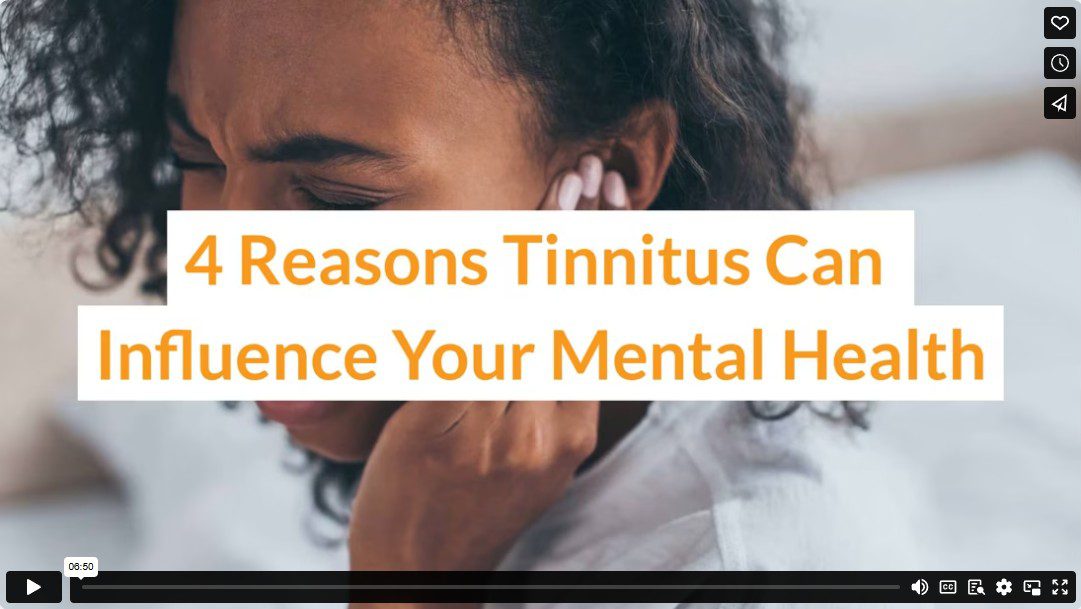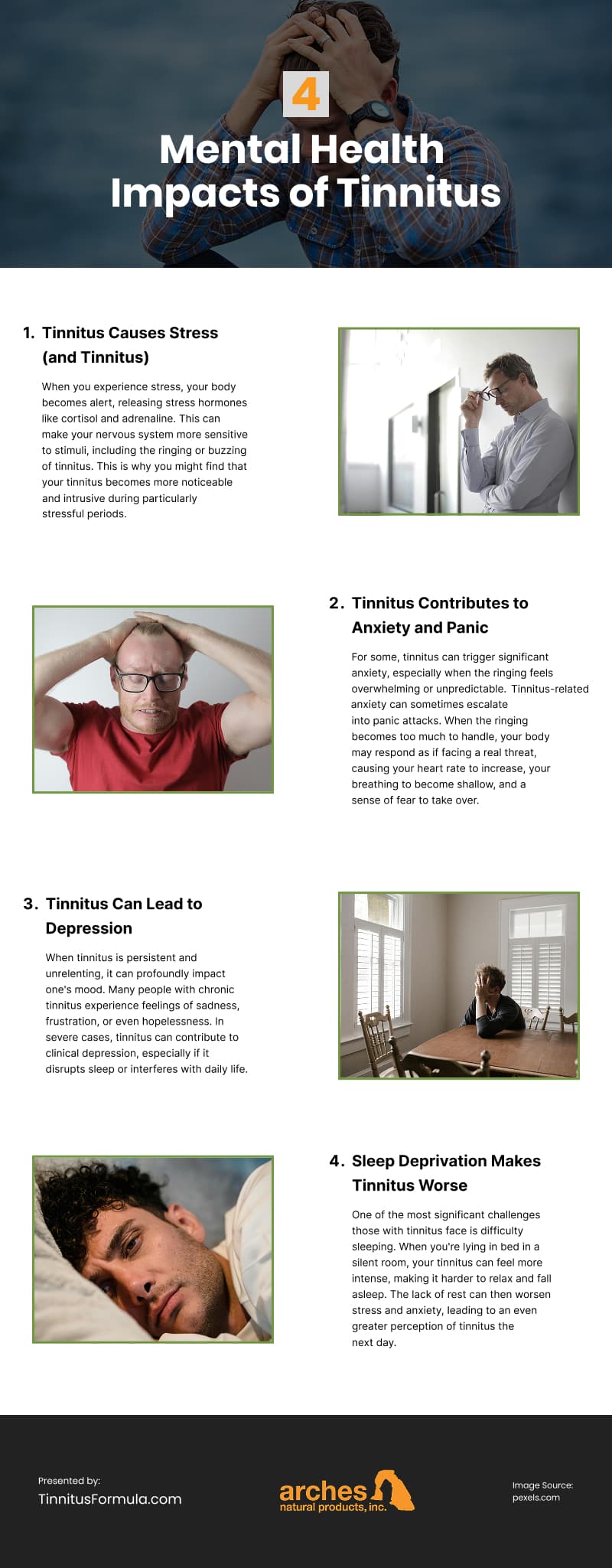By Barry Keate
Barry Keate, has lived with tinnitus over 40 years and has published 150+ research articles on numerous aspects of tinnitus. He is an expert on the condition and a well-known advocate for those with tinnitus.

(freepik/Freepik)
Tinnitus is more than just a persistent ringing in your ears—it’s an invisible struggle that can take a serious toll on your mental health. If you’re dealing with tinnitus, you may have noticed it affects far more than just your hearing. It can disrupt your sleep, make it difficult to concentrate, and trigger feelings of stress, anxiety, and even depression.
The link between tinnitus and mental health is well-established, but many people don’t realize just how deeply connected they are. The emotional distress caused by tinnitus can create a frustrating cycle—when stress and anxiety worsen, so does your perception of the ringing. This cycle can make it feel like there’s no escape, but the good news is that you can take steps to break it.
Here we’ll explore the connection between tinnitus and mental health, helping you understand its emotional impact on your daily life. It will also help you discover strategies to manage your symptoms and your well-being.
1. Tinnitus Causes Stress (and Tinnitus)
Have you ever noticed that your tinnitus seems louder when you’re stressed? You’re not imagining it. Stress and tinnitus are closely linked, and one can easily make the other worse.
When you experience stress, your body becomes alert, releasing stress hormones like cortisol and adrenaline. This can make your nervous system more sensitive to stimuli, including the ringing or buzzing of tinnitus. This is why you might find that your tinnitus becomes more noticeable and intrusive during particularly stressful periods.
The problem is that tinnitus itself is a major source of stress for many people. The frustration of dealing with constant noise can cause tension and anxiety, creating a seemingly endless loop where stress amplifies tinnitus which fuels even more stress. This cycle can be difficult to break, but it can be done. By incorporating relaxation techniques, such as deep breathing, meditation, or yoga, you can lower your overall stress levels and, in turn, find the relief you are seeking.
2. Tinnitus Contributes to Anxiety and Panic
For some, tinnitus can trigger significant anxiety, especially when the ringing feels overwhelming or unpredictable. You may feel constantly on edge, worried that the noise will interfere with your daily activities. This heightened state of anxiety can make it difficult to focus at work, enjoy social events, or even find peace in quiet moments.
Tinnitus-related anxiety can sometimes escalate into panic attacks. When the ringing becomes too much to handle, your body may respond as if facing a real threat, causing your heart rate to increase, your breathing to become shallow, and a sense of fear to take over. Many people with tinnitus report feelings of helplessness or dread, especially if they believe there’s no way to escape the sound.
One way to combat tinnitus-induced anxiety is by retraining your brain’s response to the noise. Cognitive-behavioral therapy (CBT) has been shown to help people with tinnitus reduce their emotional reaction to the sound, making it feel less intrusive over time.
3. Tinnitus Can Lead to Depression
When tinnitus is persistent and unrelenting, it can profoundly impact one’s mood. Many people with chronic tinnitus experience feelings of sadness, frustration, or even hopelessness. In severe cases, tinnitus can contribute to clinical depression, especially if it disrupts sleep or interferes with daily life.
Depression caused by tinnitus often stems from a sense of loss of control. The idea that the ringing may never go away can make you feel powerless. Additionally, tinnitus stress can be difficult for loved ones to understand. Over time, this can lead to social withdrawal, lack of motivation, loneliness, and difficulty finding joy in activities you once loved.
If you’re struggling with tinnitus-related depression, it’s important to know that help is available. Seeking support from a mental health professional, joining a tinnitus support group, or talking to others who understand your experience can make a huge difference. Additionally, lifestyle changes such as regular exercise and a healthy diet can help boost your mood and improve your overall outlook.
4. Sleep Deprivation Makes Tinnitus Worse
One of the most significant challenges those with tinnitus face is difficulty sleeping. When you’re lying in bed in a silent room, your tinnitus can feel more intense, making it harder to relax and fall asleep. The lack of rest can then worsen stress and anxiety, leading to an even greater perception of tinnitus the next day.
Sleep deprivation doesn’t just impact your mood—it also affects your brain’s ability to process sound. Studies have shown that poor sleep can make you more sensitive to noise, meaning tinnitus may feel louder and more intrusive when you’re exhausted.
To improve your sleep and reduce the impact of tinnitus at night, consider creating a bedtime routine that promotes relaxation:
- Use a white noise machine or a fan to mask tinnitus.
- Practice deep breathing exercises before bed.
- Avoid caffeine and screen time in the hours leading up to sleep.
Making small adjustments to your nighttime habits can help you get the rest you need, making it easier to manage both tinnitus and your mental health.
Strategies for Managing Tinnitus and Mental Health
While tinnitus can be challenging, it’s important to remember that you can take control over how you respond to it. By taking steps to manage both your tinnitus and your mental health, you can reduce its impact on your daily life.
Some effective strategies include:
- Using natural supplements: Ingredients like Ginkgo biloba, zinc, and vitamin B12 for tinnitus have been shown to support ear health and reduce tinnitus symptoms.
- Practicing mindfulness and relaxation techniques: Meditation, yoga, and breathing exercises can help calm your nervous system and reduce the stress response that amplifies tinnitus.
- Engaging in sound therapy: Masking tinnitus with background noise can make it feel less noticeable, helping you focus on other things.
- Seeking professional help: Therapists specializing in tinnitus can provide coping techniques to help you adjust and reduce the emotional impact of tinnitus. Cognitive Behavioral Therapy (CBT) can be an effective strategy for coping with tinnitus symptoms.
- Maintaining a healthy lifestyle: Regular exercise, a balanced diet, and proper hydration can all contribute to better overall well-being and make tinnitus feel less disruptive.
By addressing both your physical and mental well-being, you can regain a sense of control and find relief from the emotional burden of tinnitus.
Taking Charge of Your Mental Health
Tinnitus may be a persistent part of your life, but it doesn’t have to control your mental health. Understanding how stress, anxiety, and depression are connected to tinnitus can empower you to take action and develop strategies that make the ringing more manageable.
While there’s no instant cure for tinnitus, you can make meaningful improvements by focusing on your well-being. Whether you incorporate relaxation techniques, explore cognitive-behavioral therapy, or try natural tinnitus relief formula, every step you take brings you closer to a better quality of life.
If tinnitus is taking a toll on your mental health, don’t hesitate to seek help. You deserve support, and resources are available to guide you through the process. By making proactive choices, you can reduce the impact of tinnitus and regain control over your emotional well-being.
Video
Infographic
Tinnitus is often misunderstood as just an annoying sound, but for many, it is a deeply disruptive condition with significant emotional and psychological effects. Read the infographic to learn about the mental health impacts of tinnitus.
Get Free Shipping!
Order now and get free shipping on either the Tinnitus Starter Kit or Combo Pack. Try the doctor recommended products with clinically proven ingredients for tinnitus. No coupon code required.



